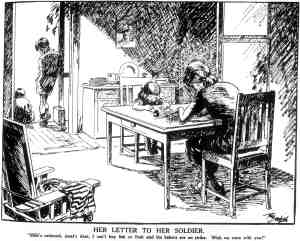The Australian people went through six years of war with considerable unity. Of course there were many divisions and tensions, but overwhelmingly the people seemed to be quite united, particularly in comparison to the World War 1 experience.

This cartoon appeared in The Bulletin, 24 March 1943 The small print reads: "Milk's rationed, meat's dear, I can't buy fish or fruit and the bakers are on strike. Wish we were with you!"
Part of the explanation for this could be the reality of the threat to Australia for much of the war. Once the Phoney War period was over, the Germans were clearly poised to defeat all of Europe, including Britain. British cities were suffering nightly aerial bombing, and the German submarines were able severely to restrict equipment and supplies reaching Britain. Then, with the entry of Japan into the war in December 1941, the Australian mainland itself seemed vulnerable to invasion.
In the Battle of the Coral Sea of 4 - 8 May 1942, a Japanese fleet was intercepted by a force of United States, Australian and New Zealand vessels. The battle was a defeat in that the Allies suffered greater losses, but the battle helped to prevent the landing of Japanese troops on the south coast of New Guinea, where they could have put Australian troops under great threat, and weakened the Japanese navy for the Battle of Midway one month later, when they were defeated in the decisive naval battle of the Pacific.
This sense of fear and uncertainty of victory had diminished by 1943, but the war still remained to be won right until 1945. This perception of the seriousness of the war meant that most people shared the same sense of priorities about the war, which in turn created a united approach.
A second possible factor was the fact that all people were able to contribute to the war effort in a meaningful and valued way. Contributions were not only coming from those in the services of direct war industries; even the most normal and routine of events, a housewife shopping and cooking for her family, was seen to have a war-related significance - rationing and shortages meant that there was emphasis on the 'kitchen front'.
While the urgency of the war and the severity of shortages started to be reduced after 1943, there was still an 'All in' emphasis till near the end of the war. And even though black marketeering developed during the war, most of it was on a very small and tolerated scale, and was not divisive. The large-scale organised rackets which developed in some places were, however, severely opposed.
To investigate this aspect of the Home Front experience by using evidence from the time, see Home Fronts at War, Ryebuck Media for ANZAC Day Commemoration Committee of Queensland.
More about the book HOME FRONTS AT WAR





